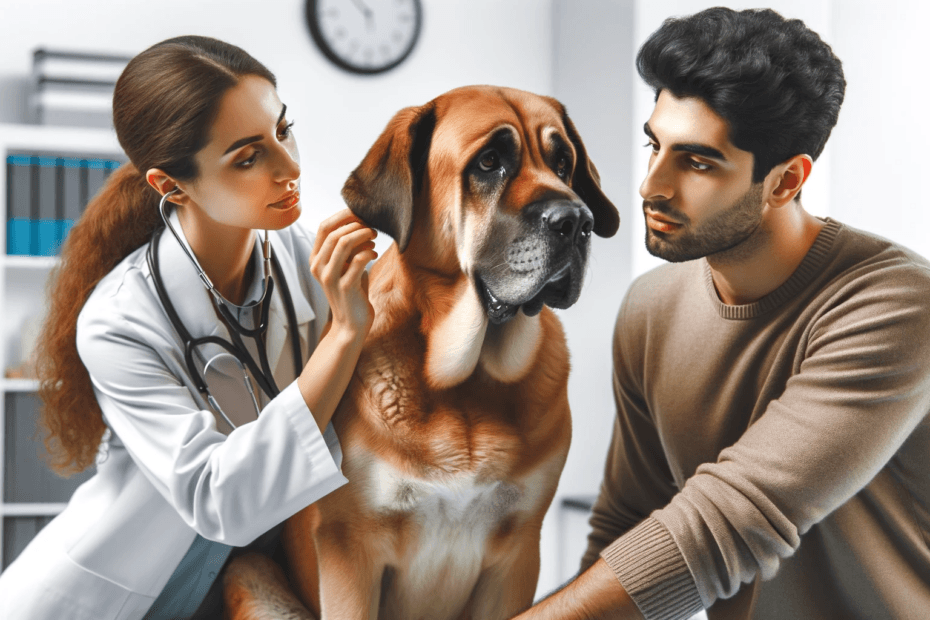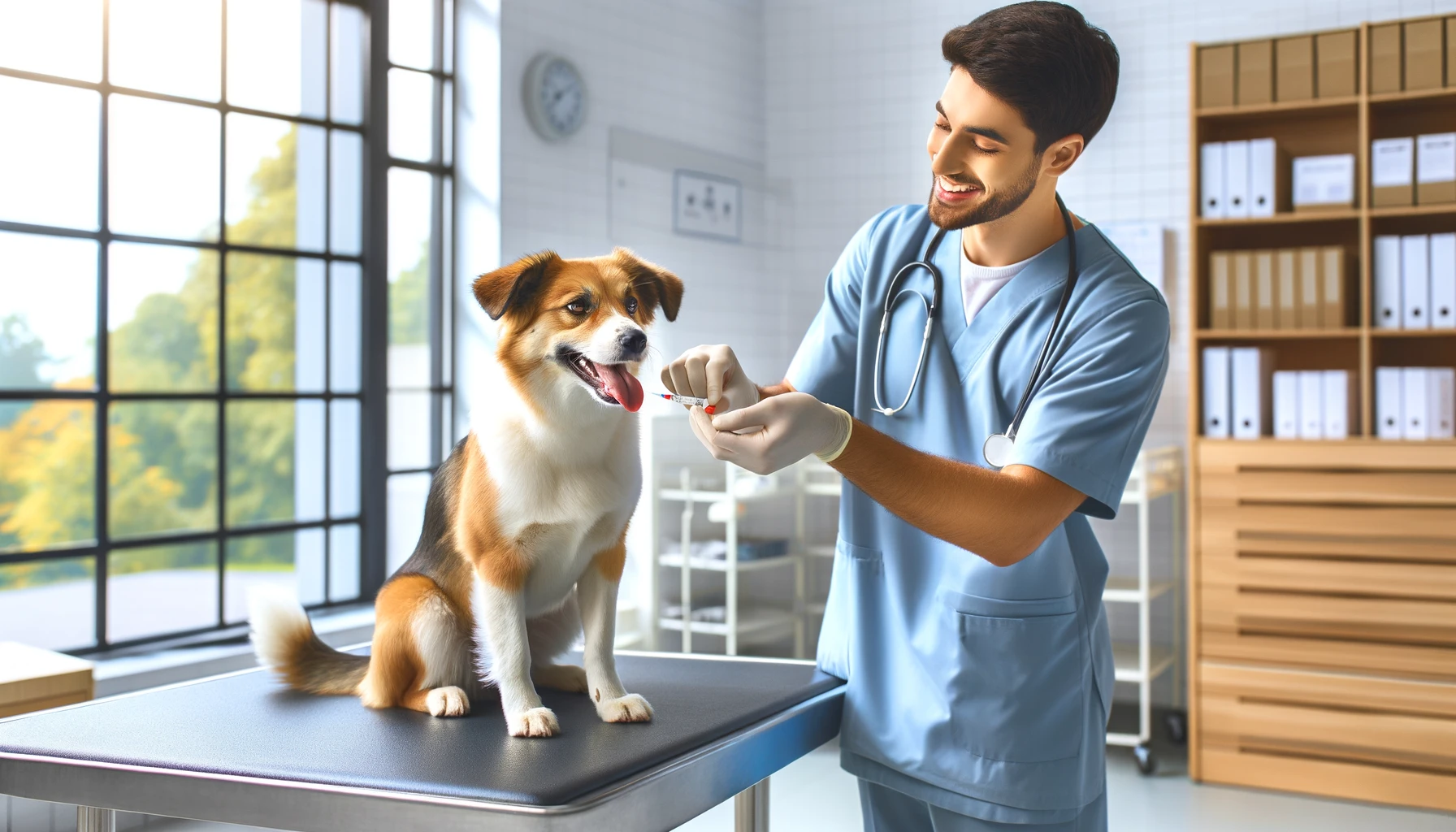Are you concerned about your dog's health? Don't worry – expert solutions are here to help.
In this article, we will address common dog health concerns and provide you with effective remedies. From skin issues to digestive problems, dental care to managing allergies, joint and mobility concerns to preventing parasites, we've got you covered.
Follow our expert advice and give your furry friend the healthy and happy life they deserve.
Key Takeaways
- Common dog skin issues can be addressed through proper nutrition, moisturizing products, and medication or topical treatments.
- Digestive problems in dogs can be managed by establishing a regular feeding schedule, using probiotics and digestive enzymes, and monitoring hydration levels.
- Preventing stomach upset involves incorporating probiotics into the dog's diet, paying attention to diet and nutrition, and avoiding feeding table scraps or toxic foods.
- Natural remedies such as herbal supplements and a bland diet can help with indigestion in dogs, and regular dental care is essential for their overall health.
Common Skin Issues in Dogs
If your dog is experiencing frequent skin issues, such as itching and redness, it's important to address them promptly. Dog skin allergies are a common cause of these problems, and they can lead to discomfort and irritation for your furry friend.
One way to address these issues is by treating dry skin, which is often associated with allergies. Dry skin can be caused by a variety of factors, including environmental allergens, food allergies, or even a lack of essential fatty acids in your dog's diet.
To treat dry skin, it's important to provide your dog with a balanced and nutritious diet. Make sure they're getting all the necessary vitamins and minerals to support healthy skin. Additionally, you can try using a moisturizing shampoo and conditioner specifically formulated for dogs with dry skin. These products can help hydrate and soothe your dog's skin, providing relief from itching and redness.
In some cases, your veterinarian may recommend medications or topical treatments to help manage your dog's skin allergies. Antihistamines, corticosteroids, or immunotherapy may be prescribed to reduce inflammation and alleviate symptoms.
Remember, it's crucial to consult with your veterinarian before starting any treatment for your dog's skin issues. They can provide a proper diagnosis and recommend the most effective course of action.
Digestive Problems and Remedies
Are you concerned about your dog's digestive health?
Diarrhea can be caused by various factors such as dietary changes or food allergies.
To prevent stomach upset, it's important to establish a regular feeding schedule and avoid giving your dog table scraps.
If your dog experiences indigestion, there are natural remedies available such as probiotics and digestive enzymes that can help restore the balance in their gut.
Causes of Diarrhea
To address digestive problems such as diarrhea in your dog, start by examining their diet and potential food allergies. Diarrhea can be caused by a variety of factors, including dietary indiscretion, sudden changes in diet, food allergies, bacterial or viral infections, and certain medications.
When your dog experiences diarrhea, it's important to monitor their hydration levels, as diarrhea can lead to dehydration. Provide your dog with plenty of fresh water and consider offering them an electrolyte solution to replenish lost fluids.
In mild cases, fasting for 12 to 24 hours can help give the digestive system a chance to rest and recover. If the diarrhea persists or worsens, it's essential to consult with your veterinarian for a proper diagnosis and treatment plan.
Preventing Stomach Upset
Wondering how to prevent stomach upset in your dog? Here are three expert solutions that can help keep your furry friend's digestive system healthy and happy:
- Incorporate probiotics into their diet: Probiotics for dogs are beneficial bacteria that can promote a balanced gut microbiome. These microorganisms aid in digestion and help maintain a healthy immune system. Look for dog-friendly probiotic supplements or choose dog food that contains probiotics.
- Pay attention to diet and nutrition: Ensure your dog's diet is well-balanced and suitable for their specific needs. Avoid sudden changes in their food and introduce new ingredients gradually. Provide high-quality, easily digestible food that's free from artificial additives or fillers. Consult with your veterinarian to determine the best diet for your dog's digestive health.
- Avoid feeding your dog table scraps or foods that are toxic to them: Certain human foods, such as chocolate, onions, and grapes, can cause stomach upset and even be toxic to dogs. Stick to a nutritious and safe diet specifically formulated for dogs to prevent any digestive issues.
Natural Remedies for Indigestion
Try these three natural remedies to help alleviate indigestion in your dog.
Herbal supplements can be effective in soothing your dog's upset stomach. Some popular options include ginger, chamomile, and peppermint. These herbs have natural anti-inflammatory properties and can help reduce gastrointestinal discomfort. You can find these supplements in various forms, such as capsules or liquid extracts, at your local pet store or online.
Another remedy is making dietary changes. Switching to a bland diet of boiled chicken and rice can help calm your dog's stomach and promote better digestion. Additionally, avoid feeding your dog table scraps or foods that are high in fat, as these can exacerbate indigestion.
Dental Care for a Healthy Dog
If you want to ensure that your dog has healthy teeth and gums, it's important to prioritize regular dental care. Proper dog dental hygiene is crucial for their overall health and well-being. Here are three key points to keep in mind when it comes to dental cleaning for dogs:
- Brushing: Just like humans, dogs need regular brushing to remove plaque and prevent tartar buildup. Invest in a dog-specific toothbrush and toothpaste, as human products can be harmful to dogs. Aim to brush your dog's teeth at least two to three times a week.
- Dental Chews: Dental chews can be a great addition to your dog's oral care routine. These treats are designed to help remove plaque and tartar while promoting healthy gums. Look for dental chews that are approved by the Veterinary Oral Health Council (VOHC) for added assurance.
- Professional Cleaning: Despite your best efforts, professional dental cleaning may still be necessary. Your veterinarian can perform a thorough dental examination and cleaning, addressing any underlying issues. Regular check-ups will help detect and prevent dental problems before they become more serious.
Managing Allergies in Dogs
To manage allergies in dogs, you need to be aware of common triggers and take proactive steps to minimize exposure. Allergies in dogs can be caused by a variety of factors, including pollen, dust mites, certain foods, and even fleas. Identifying the specific allergen can be challenging, but allergy testing can help narrow down the culprits. By understanding what triggers your dog's allergies, you can better manage their symptoms and improve their overall well-being.
Once you have identified the allergens, there are several natural remedies that can help alleviate your dog's allergy symptoms. One option is to introduce a hypoallergenic diet that eliminates common allergens such as grains and certain proteins. This can help reduce the frequency and severity of allergic reactions. Additionally, there are natural supplements available that can support your dog's immune system and reduce inflammation.
In addition to managing your dog's diet, it's important to create an allergen-free environment. Regularly cleaning your home, using hypoallergenic bedding and air filters, and minimizing exposure to potential allergens can make a significant difference in your dog's comfort.
Joint and Mobility Concerns
If your dog is experiencing joint and mobility concerns, there are several steps you can take to prevent further issues and improve their overall mobility.
Regular exercise, such as daily walks and gentle play, can help keep their joints healthy and maintain muscle strength.
Additionally, providing them with a balanced diet that includes joint-supporting supplements can also contribute to their joint health and mobility.
Preventing Joint Issues
Take proactive steps to prevent joint issues and maintain your dog's mobility and overall health. Here are three key strategies to help prevent arthritis and support your dog's joint health:
- Provide a balanced diet: Proper nutrition plays a crucial role in preventing joint issues. Ensure your dog's diet includes essential nutrients like glucosamine and omega-3 fatty acids, which promote joint health and reduce inflammation. Consult with your veterinarian to determine the best diet for your dog's specific needs.
- Maintain a healthy weight: Excess weight puts additional strain on your dog's joints, increasing the risk of joint problems. Help your dog maintain a healthy weight through regular exercise and portion control. This will reduce the stress on their joints and promote overall mobility.
- Consider joint supplements: Joint supplements can provide additional support for your dog's joint health. Look for supplements that contain ingredients like glucosamine, chondroitin, and MSM, as these can help improve joint function and reduce the risk of arthritis.
Improving Mobility in Dogs
Improve your dog's mobility and address joint and mobility concerns with these expert solutions.
Regular mobility exercises can help keep your dog's joints strong and flexible. Incorporate activities like walking, swimming, and gentle stretching into your dog's daily routine. These exercises promote blood circulation, reduce stiffness, and improve range of motion.
Additionally, consider incorporating joint supplements into your dog's diet. Glucosamine and chondroitin are common supplements that can help support joint health and reduce inflammation. Omega-3 fatty acids, such as fish oil, can also provide anti-inflammatory benefits. Consult with your veterinarian to determine the appropriate dosage and type of supplements for your dog.
Preventing and Treating Parasites
To keep your dog healthy and free from parasites, it's important to regularly administer preventive treatments recommended by your veterinarian. Here are three key steps you can take to prevent and treat parasites in your dog:
- Preventing Fleas, Ticks, and Heartworms: Fleas, ticks, and heartworms are common parasites that can cause serious health issues in dogs. Use monthly flea and tick prevention products recommended by your vet to protect your furry friend from these pesky parasites. Additionally, consider using heartworm preventives all year round to safeguard your dog against heartworm disease, which can be fatal if left untreated.
- Deworming Dogs Regularly: Parasitic worms, such as roundworms, hookworms, and tapeworms, can cause various health problems in dogs. It's essential to deworm your dog regularly, especially if they spend time outdoors or have contact with other animals. Your veterinarian can recommend the appropriate deworming schedule based on your dog's age, lifestyle, and risk factors.
- Maintaining a Clean Environment: Regularly clean and sanitize your dog's living area, including their bedding, toys, and surrounding areas. This helps prevent the buildup and spread of parasites. Vacuuming your home frequently can also help eliminate any flea eggs or larvae that may be present.
Frequently Asked Questions
How Can I Prevent My Dog From Developing Dental Problems in the First Place?
To prevent dental problems in your dog, it's important to establish a regular oral hygiene routine. Brush their teeth regularly, provide chew toys, and feed them a balanced diet. These simple steps can help maintain their dental health.
Are There Any Natural Remedies for Managing My Dog's Digestive Issues?
You can manage your dog's digestive issues with natural remedies and holistic approaches. There are several options available, such as probiotics, digestive enzymes, and a balanced diet. Consult with your vet for the best solution.
Can Dogs Develop Allergies Later in Life, Even if They Have Never Shown Any Symptoms Before?
Yes, dogs can develop allergies later in life, even if they've never had symptoms before. It's important to monitor any changes in behavior or physical symptoms and consult a veterinarian for proper diagnosis and treatment.
Is There a Specific Diet or Exercise Regimen That Can Help Improve My Dog's Joint Mobility?
To improve your dog's joint mobility, incorporate a specific diet rich in omega-3 fatty acids and joint-supporting nutrients. Additionally, regular exercise, such as daily walks and low-impact activities like swimming, can help strengthen their muscles and joints.
What Are Some Effective Ways to Prevent Parasites in My Dog, Other Than Using Medication?
To prevent parasites in your dog without medication, there are natural alternatives and holistic approaches you can try. These methods can include regular grooming, keeping your dog's living area clean, and using natural repellents.
Conclusion
In conclusion, addressing common dog health concerns is crucial for maintaining a happy and healthy pet. By being aware of skin issues, digestive problems, dental care, allergies, joint and mobility concerns, and parasites, you can take proactive steps to prevent and treat these issues.
Regular veterinary check-ups and a well-balanced diet are essential for your dog's overall well-being. Remember to consult with a trusted veterinarian for expert advice and solutions to ensure a long and happy life for your furry friend.






